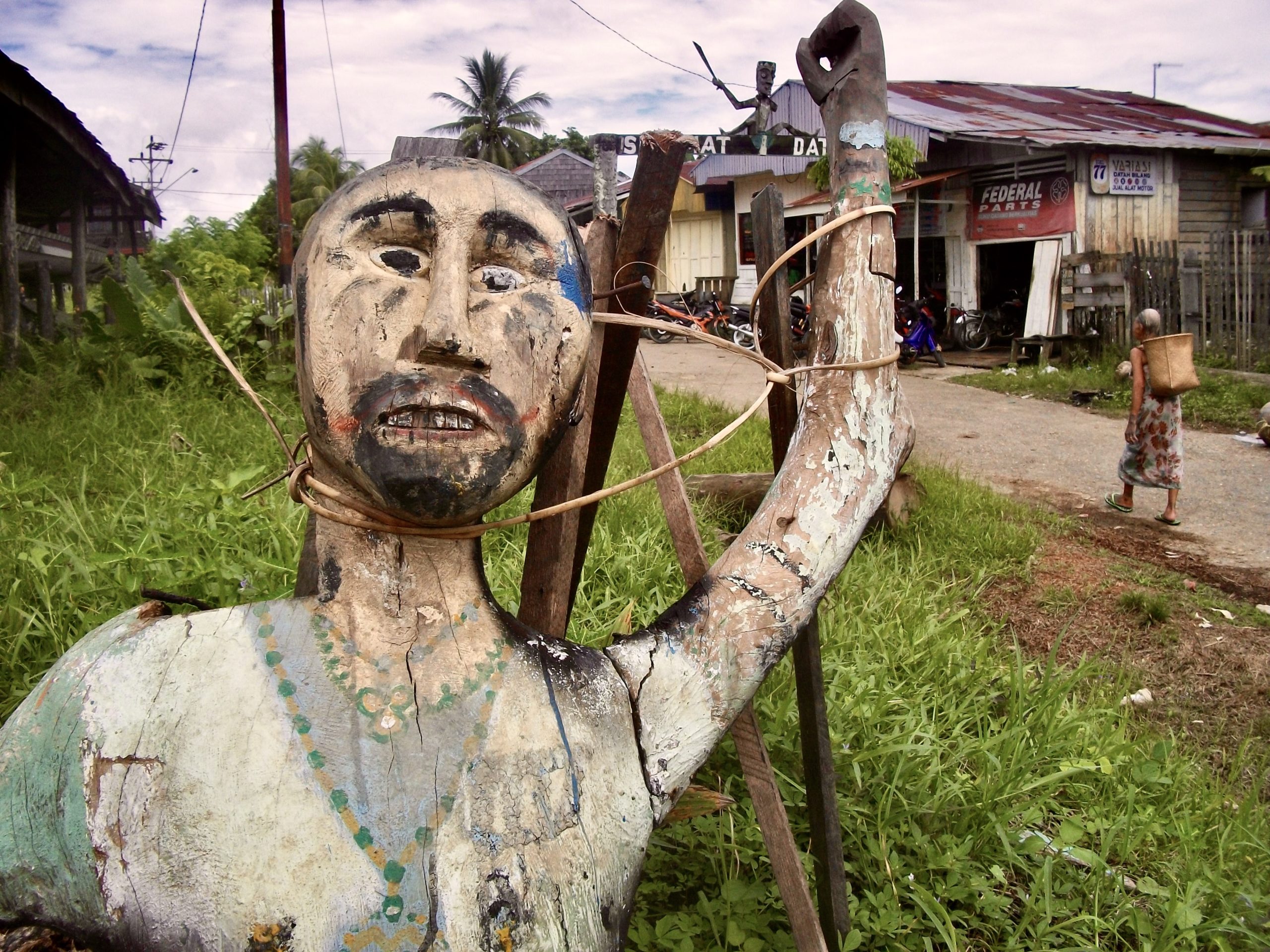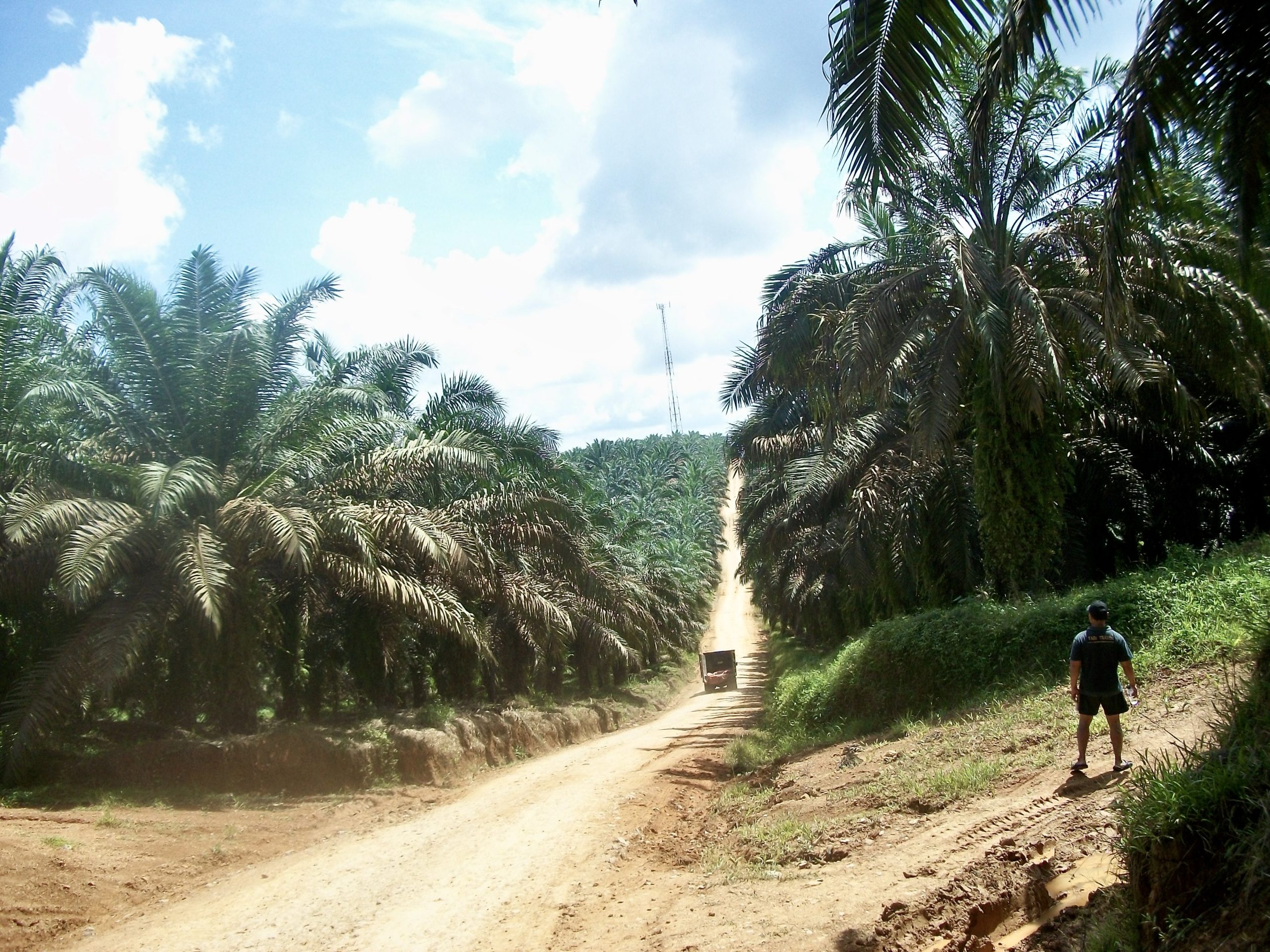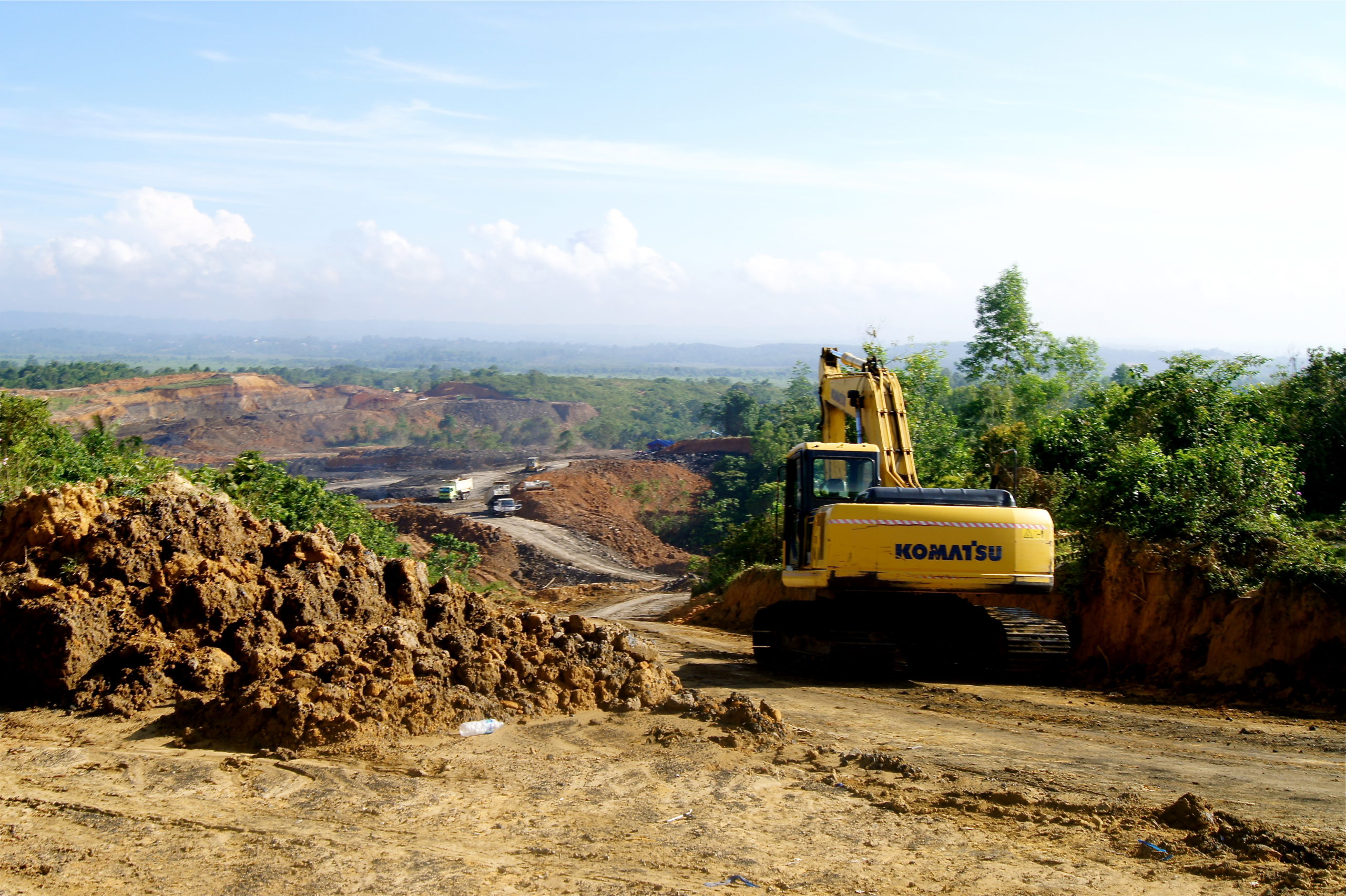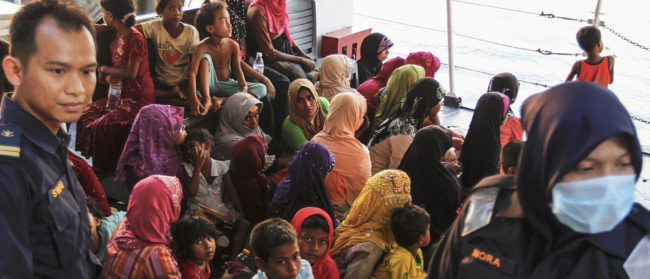An accident rarely strikes alone. For the Dayak people of Kalimantan, the Indonesian part of the great island of Borneo, this is a proverb with nearly prophetic undertones.
For Dayaks, 2020 became the year of three combining strikes: The global pandemic, a criticised political reform package labelled ‘the Omnibus Bill’, and the announcement of a purpose-made Indonesian jungle capital in East Kalimantan.
“Covid-19 has struck hard on indigenous Dayak communities, and in a time of a lot of uncertainty,” Frans Sani Lake, project manager at social advocacy movement Justice, Peace and Integrity of Creation Kalimantan (JPIC), told the Globe.
“The Dayaks’ opportunities to get together and assist each other have been limited, and they can’t keep up to date with what’s going on around them.”
Dayaks are a native people numbering 3.2 million, spanning seven major ethnic groups and over 400 subgroups. A vast majority still reside in the interior of Borneo, and are traditionally self-sufficient in hunting, gathering and small-scale agriculture.
“For Dayak tribes, the wilderness, hills, mountains and water sources are the most sacred areas, because they are believed to be places of meditation for the spirits and their ancestors,” Dismas Aju, a journalist and an administrator of the Dayak Council of National Dayak Adat Judges, told the Globe.
But the mingling of pandemic conditions and the looming prospect of even more intense settlement of their traditional lands is raising an existential threat to a way of life that has existed here for countless generations.
As economic boosters in Jakarta push the country into a lurching arc towards their vision of modernity, they lay bare the knives that shred the Dayak’s traditional social contract – a thousand-year-old relationship between isolated tribes later embedded into scattered Muslim sultanates.

Stigmatisation, structural racism and being seen as ‘backwards’ are but a few of the challenges that many of Indonesia’s twenty million indigenous people still battle
Today, as Indonesia celebrates more than 75 years as an independent nation, data suggests much remains to be done for the island-nation’s indigenous peoples. Stigmatisation, structural racism and being seen as ‘backwards’ are but a few of the challenges that many of Indonesia’s twenty million indigenous people still battle.
According to Human Rights Watch, Indonesian authorities have failed to protect the rights of its indigenous peoples, who have lost traditional forests and livelihoods in large scale, primarily to palm oil plantations. The Dayak people, Greenpeace states in a 2021 report, now find “their culture and way of life are threatened because of corporate greed and lack of government support”.
Since Indonesia’s Constitutional Court in 2013 ruled that customary forests previously seized by the state should be handed back to indigenous communities, about 50 groups have been given control over forest areas totalling some 25,000 hectares in Kalimantan. This is still a mere fraction of the island of Borneo’s original 70 million hectares of rainforest, of which 4.4 million hectares were burnt only between 2015 and 2019.
Up the river
The Mahakam River runs straight into the heartland of Dayak civilisation, but since the 1970s it’s also been a hotspot for domestic transmigration from other Indonesian islands such as Bali, Java and Madura.
The Mahakam travels 900 kilometres, or 560 miles, from its source far up Borneo’s interior, reaching the Makassar Strait east of Samarinda, the capital of East Kalimantan. The river snakes along virgin forests, isolated Dayak villages and illegal coal mines, never far away from where the outskirts of Indonesia’s future capital will stretch out its new-born fingers.
River boats on this quiet stretch of water erase the perception of time – but its passengers are shaken back to the present when barges carrying pyramid-like coal stacks push all others to steer aside.
Coal was first mined in Kalimantan in 1882 at a place called Loa Kulu, near the Mahakam. Further into the greenery, palm oil is king. In Kalimantan, palm oil plantations are estimated to cover some 650,000 hectares (or 1.6 million acres), replacing large swaths of forest that used to function as a wall against flooding and erosion. The industry, along with coal mining, were linked to floods in January that claimed at least twenty lives, displaced more than 112,000 people and affected some 200,000 hectares of land.
“It’s cheap to clear forests illegally near Mahakam,” local freelance tourist guide Suryadi told the Globe. “You’re in the clear and have an easy path for both transportation and to escape if you, against all odds, get caught.”
The Dayak’s world is a 130-million-year-old rainforest (more than twice as old as the Amazon) with the greatest density of plant species. It was not until the late 1960s, in the wake of President Suharto’s power surge and the genocide of between 500,000 and one million people all over Indonesia, that Kalimantan was systematically zoomed in on by industrial interests.

Suharto opened up Indonesia to foreign interests and governed with “an authoritarian contract”, which paved the way for millions of hectares of rainforest to be cleared for rubber, palm oil and timber. Burnt forests cleared land and filled the sky with dust, that between the 1970s and 1990s covered large parts of both Kalimantan and Sumatra, as well as Malaysia and Singapore.
By then, the Dayaks were marginalised and unable to compete with transmigrants relocated to the region from densely populated Java and Sumatra by central government, who were not only entitled to two hectares of fertile land, but also to fertilisers and access to roads and education.
Decades of state-sponsored transmigration programmes, something many local Dayaks dub as a “Javanisation” of Kalimantan, have led to ethnic segregation, inter-ethnic competition over land, natural resources, and political representation and voice.
“We don’t really know if we have customary lands today any more, in the way we used to define it. There are no lands where the state’s intervention is not felt, or where we have complete discretion in managing our land collectively,” an anonymous Dayak community member in East Kalimantan told the authors of the anthology Conflict and consent: The oil palm sector at a crossroads.
Displacement from land, either directly or indirectly, due to the palm oil bonanza is one of many issues – direct confrontations between company and community is another. Long Bentuq is one of many logging hotspots, and one where an ever-more desperate local population block company roads as a last attempt to halt felling to make way for palm oil plantations. This was an economic frenzy that eventually led to global consequences.
“The global impact [of Kalimantan’s logging, palm oil and mining development] was only seen in the late 1990s,” Andreas Harsono, journalist and researcher at Human Rights Watch, writes in his book Race, Islam and Power.
The future for Dayak communities was, even prior to Covid-19, embedded in a political and social mist due to the effects of transmigration policies and palm oil bonanza. In a 2019 Dayak protocol called Tumbang Anoi, representatives for many native tribes called upon Indonesian President Joko Widodo to sharpen the indigenous peoples’ tools to refuse grants to palm oil producers settling on traditional lands.
The situation is, said Dismas Aju, already severe, with the ongoing demise of Kalimantan’s ecosystem contributing to the fall of Dayak culture.
“The attitude of the Dayaks in general is to reject deforestation. It must be rejected. But palm oil plantation permits are now in the hands of the Indonesian government at the central level,” he said.
In October, Indonesia surpassed the Philippines as recording the most cases of Covid-19 in Southeast Asia, with 1.2 million documented cases in mid-February.
Frans Sani Lake said the Dayaks of Kalimantan tend to fend off diseases and viruses such as Covid-19 through “self-isolation”, closing down villages and settlements to outsiders – and authorities. This way of coping is based on the understanding that they often carry no antibodies against new diseases. Despite these efforts, Frans Sani Lake explained that JPIC figures show over 5,000 cases of Covid-19 have been documented inside the self-isolated Dayak communities in Kalimantan.
“Of these, we estimate around 170 deaths,” he said. “Access to health is scarce and far from adequate. Also, not even local authorities follow their own health restrictions,” he said.
Furthermore, a high price tag of individual Covid-19 tests keeps potential cases in the dark. “It makes it extremely difficult to map the virus spread.”
The government has revised regulations prohibiting open mining in protected forests to facilitate mining companies’ investments. The Indigenous Peoples’ movement must anticipate the development of the Omnibus Law
As the coronavirus outbreak has inflicted suffering on the Dayak community throughout 2020, so too will President Joko Widodo’s “liberalisation” of public lands as a part of the government’s controversial, recently-passed Omnibus Bill.
The Omnibus Bill – which included some 400-odd law reforms, among them opening up land that houses indigenous tribes and protected forests to development – elicited a strong reaction from both the political opposition and the general public for measures that stood to benefit Indonesia’s political and economic elite. Citizens took to the streets in October in violent protests against President Widodo’s version of a “foreign investor friendly Indonesia”.
“What surprises me the most is just how bad the reform package really is,” Andreas Harsono, author and journalist connected to Human Rights Watch, told the Globe.
From now on, with President Widodo’s blessing, the door is wide open for developers into virgin forests in West Papua and Kalimantan, the International Work Group for Indigenous Affairs stated in its 2020 Indonesia report.
“The government has revised regulations prohibiting open mining in protected forests to facilitate mining companies’ investments. The Indigenous Peoples’ movement must anticipate the development of the Omnibus Law,” the rights organisation summarised.

Carbon storage facility
Policymaking in Indonesia bears resemblances to Brazil, where traditional lands either belonging to or housing indigenous peoples have been grabbed in large scale by mining and agricultural interests, often tied to political power players.
In the case of Borneo, as well as the Amazon, the loss of forest robs the planet of one of its most important and effective carbon storage facilities. A whole ecosystem, and its global necessity, is hung out to dry with the foundation of a new Indonesian capital at the heart of Borneo’s jungle. Its development is set to drive yet another nail in the coffin, excluding Dayaks from whatever future awaits them post-Covid-19 and the cultivation of a new jungle capital.
In an ever-expanding Indonesia – home to 273 million people, and as socioeconomically pressured by overpopulation as it is politically pressured by the pandemic – Joko Widodo has made “infrastructure” his political gospel.
A few months prior to the outbreak of Covid-19 in Wuhan, Widodo stated that Indonesia’s new nation capital will be built in East Kalimantan; far away for the current capital of Jakarta – home to nearly 11 million people and sinking into Java Sea as a result of overpopulation and an unstable urban structure.
The Indonesian government has claimed 3,000 hectares (or 7,413 acres) of land in East Kalimantan for the first stage of development, planned to begin in 2024 at a primary cost of $45 billion.
This is why Dayak culture and access to forests and land must be guaranteed in the form of “special autonomy”, said Dismas Aju.
“The development of a new Indonesian capital in East Kalimantan should also be based on Dayak culture, in line with twentieth-first century cultural diplomacy,” he told the Globe. “The problem is, until now there has been no response from the Indonesian government to the demand for special autonomy, and we are about to demand an answer from Jakarta in late February.”
Harsono said the Free Prior and Informed Consent principles should be implemented in the settlement of a new Indonesian capital in East Kalimantan.
“From the perspective of the Dayak people, the Indonesian government should ask them first about choosing their forest to be the site of the nation’s future capital,” he said.
Socially and politically locked down
Against all these odds, JPIC project manager Frans Sani Lake believes that Dayaks are equipped to overcome the pandemic. Having said that, much work and political goodwill must be invested to secure indigenous peoples’ basic human rights and place in tomorrow’s Kalimantan.
“Above all, they now realise that their best chance to get through to the other side is to put their trust and belief to their traditional and ancient knowledge,” he said. But whether they want to or not, he adds, “They are left to themselves.”
In the village of Tanjung Isuy, local Dayaks lament a collective lost sense of hope, and talk about a way of life which succeeds in fooling natural laws. “We shouldn’t be able to survive here”, one woman told the Globe, pre-Covid-19.
She attempts to describe what the future holds for Kalimantan’s Dayak population – for the hundreds of tribes who have seen the island of Borneo, its greenery and resources as a wall against mean spirits and diseases and plagues brought by European colonialism and Jakarta-initiated transmigration policies.
“When all the mines and plantations have arrived,” she said, “It’s just a matter of time before it’s all over.”
Klas Lundström is an investigative reporter who focuses on environmental issues, mining production and indigenous people. He is the author of several books on Timor-Leste, Indonesia and West Papua (co-authored with Ivar Andersen).


